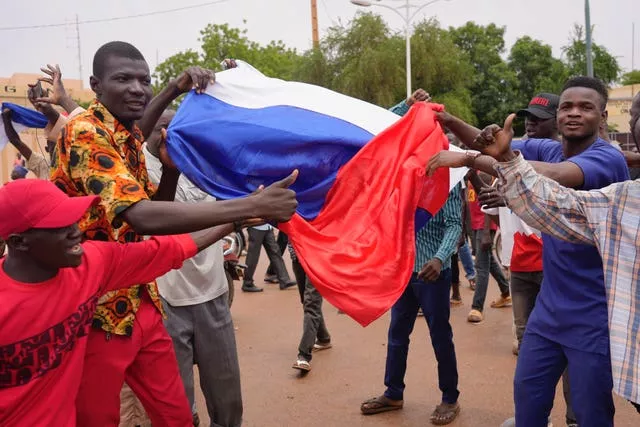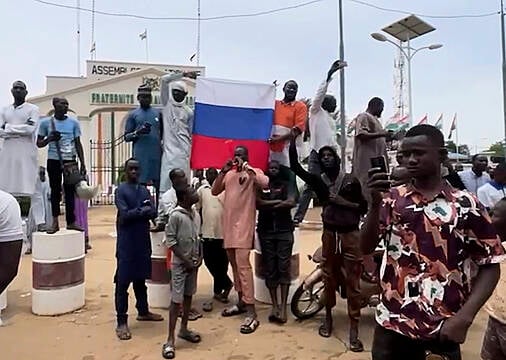It is still unclear who is running Niger – two days after mutinous soldiers ousted the country’s democratically elected president.
It comes as analysts warned that political chaos could set back the fight against extremist groups and increase Russia’s influence in the region.
On Thursday, several hundred people gathered in the capital, Niamey, and chanted support for the Russian private military group Wagner while waving Russian flags.
They later burned cars and ransacked the headquarters of the president’s political party.
Omar Issaka, one of the protestors, said: “We’re fed up. We are tired of being targeted by the men in the bush… Down with the French people. We’re going to collaborate with Russia now.”
The soldiers have not announced a leader and Mohamed Bazoum, who was elected president two years ago in Niger’s first peaceful, democratic transfer of power since its independence from France in 1960, has not resigned.
Some of the last public communications from the government included a defiant tweet by the president on Thursday saying democracy will prevail and a call by the foreign minister Hassoumi Massoudou, on media outlet France 24, for Nigeriens to stand against the mutiny.
A source close to the president said Mr Bazoum has no intention of resigning and talks are ongoing.
However, it is unclear who is involved in these dialogues, the nature of the discussions or how they are proceeding.

Analysts say the coup could destabilise the country and threatens to starkly reshape the international community’s engagement with the Sahel region.
Mr Bazoum is a key ally in the West’s efforts to battle jihadists and the West African nation has been seen as the last major western partner standing against extremism in a region where anti-French sentiment has paved the way for the Russian private military group Wagner.
Neighboring Mali and Burkina Faso have both ousted the French military, which previously provided aid in their fight against jihadists.
Mali has contracted Wagner and it is believed the mercenaries will soon be in Burkina Faso.
Earlier this week, The Economic Community of West African States said it was sending Benin President Patrice Talon to lead mediation efforts, but as of Friday Mr Talon was not in the country.
During their first address to the nation on Wednesday night, the mutineers urged “external partners” not to interfere.
French foreign minister Catherine Colonna told French media on Friday that President Emmanuel Macron has spoken several times to Mr Bazoum.
Ms Colonna said France believes there are still possible exits from the crisis and that Paris regards the attempted coup as lacking legitimacy.

On Thursday, US vice president Kamala Harris said the country’s “substantial co-operation with the government of Niger is contingent on Niger’s continued commitment to democratic standards”.
Niger could lose millions of dollars in military aid and assistance, which the United States and European countries have recently poured in a bid to help in the fight against Islamic extremism.
The US in early 2021 said it had provided Niger with more than 500 million dollars (£391.3 million) in military assistance and training programmes since 2012, one of the largest such support programmes in sub-Saharan Africa.
The European Union earlier this year launched a 27 million euro (£23.2 million) military training mission in Niger.
The United States has more than 1,000 service personnel in the country.
France has 1,500 soldiers, who conduct joint operations with the Nigeriens.
The coup has dashed hopes of collaboration between Sahelian countries and western powers, which offered a more robust response to the jihadist insurrection when compared with the strategies to arm civilians in Burkina Faso or the responsibility given to Wagner in Mali, said Ibrahim Yahaya Ibrahim, senior Sahel analyst for the International Crisis Group.
As uncertainty lingers about who is in charge, insecurity could worsen.
“The army officers will be busy positioning themselves in power struggles and abandon the fight against jihadists,” said Ulf Laessing, head of the Sahel programme at the Konrad Adenauer Foundation.
Rights groups also say civilians always bear the brunt of these mutinies.
“During a coup, the first victims are always the same: the most vulnerable, women and children,” said Drissa Traore, secretary-general of the International Federation for Human Rights.
On Thursday, the United Nations Office for the Co-ordination of Humanitarian Affairs said it has paused operations in Niger, where more than 370,000 people are internally displaced and more than four million rely on aid.







